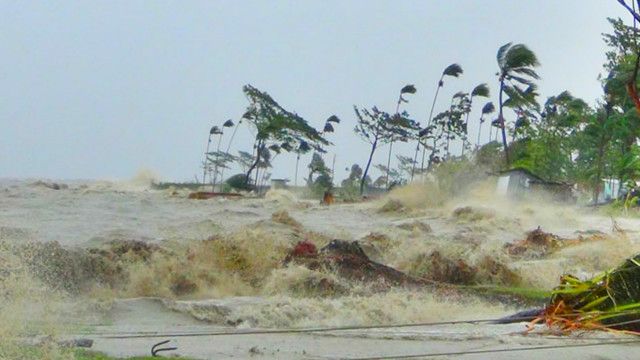UNICEF calls for building climate-smart social services to cope climate-related shocks
VGP - UNICEF is calling for urgent action from governments, businesses and donors, to invest in building climate-smart social services including education, healthcare and water supply and sanitation, early warning systems, and climate-responsive social protection such as cash transfers.

UNICEF Viet Nam is taking action, working with the Government to assess the climate landscape for children and identify capacity gaps in the disaster management system, employing a child-centric approach.
UNICEF has conducted surveys on possibilities of solar rooftop installation in schools, health centers and water supply schemes; and also tested the Children Climate Risk Index methodology.
Most of these initiatives are now ready to be scaled up. These comprehensive assessments provide a solid foundation for evidence-based policy change and investment for children and ensure that climate-related programs and plans are informed by accurate data and tailored to the specific needs of children and communities in Viet Nam.
UNICEF also plans to implement net zero climate-resilient social services and infrastructure across various regions in Viet Nam.
The aim is to establish net zero climate-resilient communities capable of effectively reducing their reliance on traditional fossil fuel - based energy, to adapt to the challenges posed by climate change.
The success of all these models will benefit children and their communities while facilitating the scale up and the replication of best practices nationwide, said Rana Flowers, UNICEF Representative in Viet Nam.
UNICEF is promoting early warning and early action-getting information to the community level-enabling everyone to prepare for and secure an adequate response to climate related challenges, she added.
For example, toward the end of this year/early next year, Viet Nam will face 'el Nino' conditions- most likely resulting in drought. Alerting families, encouraging them to collect rainwater, offering them alternatives to clean water sources will be essential.
In preparing and supporting in a timely fashion, UNICEF supports early action - that ensures the most vulnerable are not paying up to 10 times the normal cost of clean water that allows families to cook and provide clean drinking water for their families. Supporting the people must remain the primary focus, reiterated Rana Flowers.
Around 99.5% of children in Viet Nam face three or more types of climate shocks
According to the latest UNICEF regional report 'Over the Tipping Point', many children are exposed to more than one type of climate and environmental shock, stress or hazard.
In Viet Nam, 99.5 per cent of children (26.2 million) face three or more types of climate shocks, compared to 89 per cent in the region and 73 per cent globally; while 94.6 per cent in Viet Nam face four or more types of shocks, compared to 65 per cent in the region and 37 per cent globally.
Children in the East Asia and Pacific region face six times more climate related shocks compared to their grandparents eroding their coping capacity and exacerbating inequality.
Over the last 50 years, the region has witnessed 11 times increase in floods; 4 times increase in storms; 2.4 times increase in droughts and 5 times increase in landslides.
According to the latest analysis, which is based on the Children's Climate Risk Index (CCRI), in the East Asia and Pacific region over 210 million children are highly exposed to cyclones; 140 million children are highly exposed to water scarcity; 120 million children are highly exposed to coastal flooding; and 460 million children to air pollution./.
